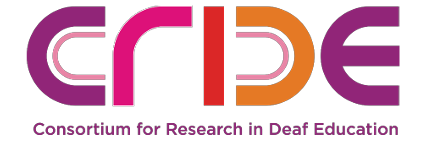New figures on educational provision for deaf children in the UK published

The latest Consortium for Research into Deaf Education (CRIDE) reports into education provision for deaf children in England, Northern Ireland and Wales have now been published by National Deaf Children’s Society (NDCS) and include unique information about those children with cochlear implants which may be useful to you.
The reports can be found online at www.ndcs.org.uk/CRIDE. These reports are a comprehensive and rich source of information on deaf children in the UK education systems including their primary form of communication and take-up of Cochlear Implants. Because the survey has been repeated over time it also provides very useful comparative data. The survey is compiled from specialist teaching services for children with hearing loss and deafness and provides essential data for future planning of services in the UK, which may be helpful for others.
Looking at the figures for England key points from the research include:
- 3,907 children known to the services (9% of the adjusted total of all deaf children) have at least one cochlear implant, which is up slightly from 8% in 2019 and 7% in 2017.
- 2,966 children have a bone conduction device. This is an increase from 2019 when 5% of deaf children were reported to have a bone conduction device. The figure stood at 4% in 2017. Overall there are 6,873 children with a hearing implant known to specialist support services.
Since 2015, when they last asked about languages used by all deaf children, the proportion using Spoken English has risen slightly from 86% to 88%. The proportion using Spoken English together with signed support has fallen from 8% to 7%. There are 756 children (2%) using British Sign Language (BSL) as their main mode of communication with 2,667 children using spoken English with signed support. To summarise:
- 88% deaf children are using Spoken English
- 7% use Spoken English with Signed Support
- 2% use BSL
The authors of the report note that ” it can be estimated that 45% of children with severe or profound hearing loss have at least one cochlear implant. If one were to make an assumption that most children with cochlear implants are those with a profound hearing loss, this percentage would rise to 77%. These proportions have risen from 41% and 71% respectively since 2019.”
It is encouraging to see that there is good access in England for children to Cochlear Implants as a publicly funded service. This does raise the question to what extent schools and settings have enough awareness that children and young people with CI’s need specialist support and advice to be able to fully take advantage of its benefits. We know from other research that this additional support and understanding can be lacking in education systems. As the report points to continuing pressure on the specialist support services and growing caseloads in some areas this suggests the need for further investment in specialist support services to ensure that hearing technology can have more impact on outcomes for children and young people.
